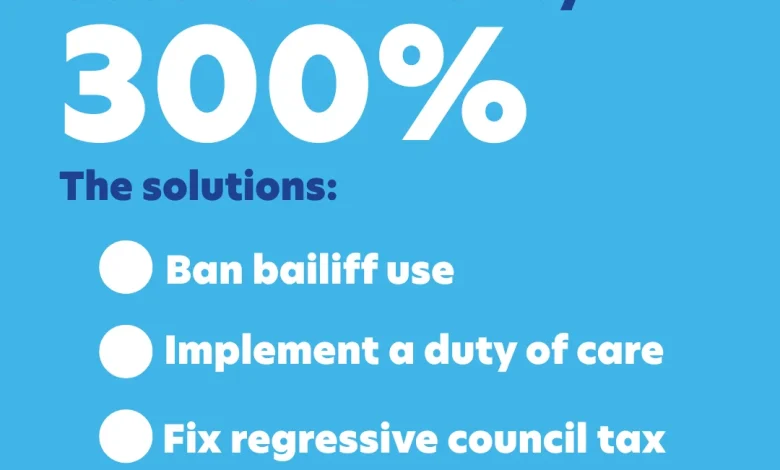The budget must address the household debt crisis

This budget will take place under the shadow of the cost-of-living crisis, which has seen a huge rise in the number of people facing unpayable debts. Unemployment is spiking, and personal insolvencies and bankruptcies are on the rise. People are simply not earning enough to cover the essentials – and being forced into debt because of it.
This debt crisis demands immediate action, and November’s budget is an opportunity to address it. Here’s how the chancellor could use this opportunity to take meaningful action to help end a crisis affecting over 10 million people.
A crisis in council tax debt
One of the fastest growing types of debt in the UK is council tax debt. Our analysis found that outstanding council tax debt has soared to £8.3 billion, an increase of 300% since 2014. Over four million people are now behind on their council tax bill. Meanwhile, bills have risen by an average of 54% in the last ten years, 18% in real terms. Council tax debt is now a core component of the wider household debt crisis.
The government has recognised the scale of the problem by launching a consultation earlier this year, but its proposals fall short. We urge the chancellor to intervene and make the following three changes.
First, ban the bailiffs
Many households are living in constant fear – dreading a knock at the door and the threat of having belongings taken because of bills that are simply unaffordable. Our research exposes the stark reality that at least a third of people in council tax debt live below the poverty line. Four-fifths earn lower than the UK average.
Our latest figures show that bailiff referrals have increased by 30% in two years to 1.7 million. Bailiff visits come at great financial and emotional cost to the person in debt and have no place within our public services.
The government must oversee a total ban if we’re to stem the enormous harm done in councils’ names. Nearly 1,400 of our supporters have written to their MPs to demand the government bans bailiffs. Clearly this is an issue that people across the country agree needs action.
Implement a duty of care
People in debt deserve support, not punishment. That’s why we are calling on the government to introduce a duty of care. This would ensure local authorities consider the wellbeing of their residents when collecting debt.
Under a new duty of care, councils would provide access to welfare support, income maximisation and debt advice. It would also mean writing off unpayable council tax debt, to ensure struggling households can rebuild their finances.
Fix regressive council tax
Council tax itself is driving a lot of the harm we see. We’re glad the chancellor is reportedly planning changes, but tweaks won’t fix a fundamentally flawed system.
Council tax is regressive: people on the lowest incomes are charged, proportionally, three times more than richer households. The system also bakes in geographical inequality, with more deprived areas paying more. As bill increases continue to outpace inflation, more people will fall into arrears.
That’s why we’re calling for the government to replace the regressive council tax with a proportional property tax.
The Fairer Share campaign proposes a flat 0.48% rate on all properties, payable by property owners. This would reduce bills for three quarters of the population by an average of £500 a year, protecting renters – and would mean fewer people falling into debt.
Addressing the wider household debt crisis
Addressing council tax debt is essential, but we also need to tackle other areas where people are facing unpayable debts. Particularly energy debt, which is predicted to grow to £5 billion this year, more than doubling in just three years.
While Ofgem’s recently announced debt write-off scheme is welcome, it barely touches the sides. A £0.5 billion write-off still leaves a mountain of debt behind. Meanwhile, the scheme is being paid for by customer bills, meaning energy companies continue to profit without contributing to the scheme. All the while, energy bills remain 42% higher they were a few years ago.
The government must expand the write-off scheme through windfall taxes so that the burden doesn’t fall on customers. More must also be done to address the extortionate cost of energy, particularly for older people and people with high energy usage due to disabilities.
An opportunity to be on the side of people in debt
Next week, the chancellor has a simple choice: keep letting millions slip further into crisis, or take the practical steps that would lift people out of debt: fix council tax, ban the bailiffs, tackle the spiralling cost of energy. Let this budget be the moment the government chooses to stand with people in debt.
If you want to help make sure the government acts, please take one minute to email your MP





